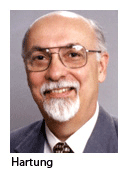With Dr. Bruce Hartung
This column continues the discussion of the February 2012 “Pressure Points” concerning spiritual warfare, which is available at http://reporter.lcms.org/?19589.
Following are two responses to last month’s column (both in italics), and my comments about each of them. The first is from a colleague who is a psychologist and Roman Catholic priest ministering in the area of addictions — especially among those in religious vocations.
“There is no question that evil forces, even satanic ones, are present and active in this world, even though we know the final victory is already won by Christ. At the same time, this language of spiritual warfare and the presence of Satan can be used in non-helpful ways by people who are struggling with addictive behavior. They will say, in effect, ‘Satan made me do it.’ There is a sense that this could be true. But it also is used, in this case, to keep away from assuming personal responsibility for the behavior involved. It is easy to say, ‘Well, the devil got to me.’ As true as that might in some instances be, we will not get anywhere until ‘I am responsible’ is said and meant. Satan can never be used as an excuse to keep from taking personal responsibility for one’s behavior.”
I think this is a very important point as the discussion about spiritual warfare continues. 
Recognizing the presence of Satan’s influence on others and on ourselves does not forfeit our personal responsibility and our culpability. It is for this that we flee to the cross of Christ (and, hopefully, utilize spiritual directors and/or confessors to specifically claim ownership of “our fault, our most grievous fault”).
From the early Genesis story of the fall of humankind, Eve blamed the serpent and Adam blamed Eve. “The Devil made me do it” or “the woman made me do it” are clear statements of people who simply are not accepting responsibility for their own actions. This kind of blaming others for our actions, rather than taking responsibility for them, is a universal defense mechanism that is employed much too much.
I can say that I withdrew in irritation with my wife and stopped talking to her for a while because she did not respond to me in as caring and empathic way as I needed and would have liked. That kind of language blames her for my behavior. It suggests not only that if she would respond differently I would also, but that she was actually responsible for what I did. In short, my behavior becomes her fault.
As my colleague points out, we can do the same kind of thing with Satan. And if we do, we follow the pattern of our first parents.
It is, thus, an important line to draw when we are putting on the lens of spiritual warfare. If we use Satan’s presence to excuse our behavior, we are excusing our own bad behavior rather than confessing it. Also, we are rationalizing what we have done and its effects, rather than taking responsibility for the impact of our behavior.
“Somehow you have hit an important chord for me. I need to be thinking more about how the forces of the evil one get at me. I don’t want to blame Satan for what I do. I do want to recognize its influence on me, though. Your raising this is sobering. I want to be more aware. As a pastor I believe I haven’t put these things together (the evil one and myself) and have always thought of myself as above this as a pastor. Pretty naive, huh? I am looking forward to more of our talking about this.”
As this topic has emerged for me over the years, one of the most sobering things that has been on my spiritual heart is the recognition that I always need to be on guard about being influenced by satanic spirits. I can no longer simply assume that I am immune. This recognition has driven me more to Christ, but the idea of my naiveté in this matter (shades of what you have shared) is humbling and a bit daunting.
I do hope our readers continue to chime in on this.
The Rev. Bruce M. Hartung, Ph.D., is associate dean of Ministerial Formation and director of the M.Div. and Alternate Route programs at Concordia Seminary, St. Louis. He can be reached at hartungb@csl.edu.
Posted March 8, 2012
